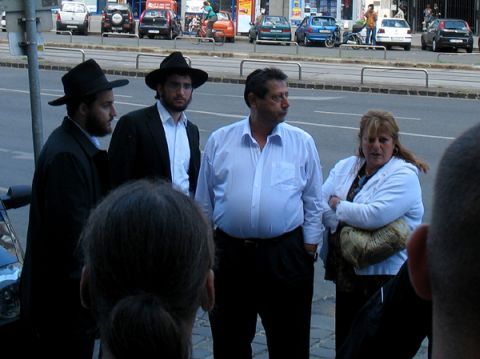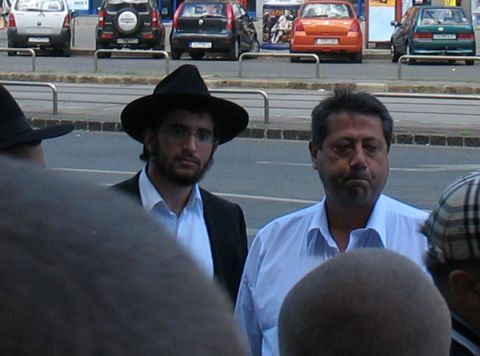It started with screaming
Posted
Neo-Nazis assault Woodmere residents visiting Hungary
By Michael Orbach
A Woodmere couple has learned first-hand that Jews may no longer be very welcome in Hungary.
Nat and Tova Farago were on a weeklong visit to Hungary to visit the graves of Nat's parents before Rosh Hashanah. In Budapest, on Shabbos, September 5th, they walked to Keren Ohr Chabad, a shul about forty-five minutes away from their hotel. Afterward, while walking down a crowded main street with two Chabad students, they suddenly found themselves surrounded by a group of forty Neo-Nazis.
“They were spitting at us and cursing at us in Hungarian: 'Dirty Jews, go home! 'We're going to break your bones!'” Farago recalled days later.
The couple did not respond to the taunts; after dousing them with beer and spit, the skinheads left. Five minutes later, as they continued down Karoly Street, the four Jews found themselves surrounded by a second group of Neo-Nazis that did much the same thing.
After the second incident, shaken up, Farago found a police car and told the officers what happened. Their response shocked him even more.
"He said 'things like this happen,' and didn't take any report," Farago said.
After he returned to America, a friend emailed to Farago pictures the incident he'd found posted on a Hungarian Neo-Nazi site.
With a prominent Jewish community, Hungary has seen an upswing in racist and anti-Semitic incidents across the country. Dr. Shimon Samuels, director for international relations at the Simon Wiesenthal Center, described Hungarian anti-Semitism as "ongoing," and said that the country is "sinking into an abyss of hate."
"Anyone who's identifiably Jewish by garb or by behavior might want to reconsider visiting Hungary at the moment," Samuels told the Jewish Star.
Hungary's relatively large Jewish community, numbering over 100,000 individuals, was able to rebound faster than communities in other Eastern European countries after the collapse of the former Soviet Union. Anti-Semitism there was kept quiet while Hungary attempted to become part of the European Union and NATO, but since Hungary successfully joined those organizations, anti-Semitism and racism have resurfaced.
"Racism has come forward and it's been exacerbated by anti-Gypsy feelings," explained Samuels. "In countries when you don't have a Jewish communities, Romas have replaced the Jews."
In turn, this has strengthened the far-right political party, Jobbik, which many have accused of being fascist and anti-Semitic. Jobbik is connected to the Magyar Guard, a descendent of the Arrow Cross militia that assisted the Germans in deporting over 400,000 Hungarian Jews to Auschwitz. While the group is officially banned, Samuels said they march openly.
The rabbi of Keren Ohr Chabad, Rabbi Shmuel Glitsenstein, said that anti-Semitism has recently worsened.
"Look, this is only starting a year ago. They never did like the Jews but it wasn't very strong and now they start and make a lot of rallies. It's very bad. It's not simple to be Jewish now and look like a Chabad rabbi," he said.
Victoria K., who grew up in Budapest and met the Farago family on their trip, dated the recent increase in anti-Semitism to political developments in 2006. She asked that her last name not be used for security reasons.
"After came the economic crisis and then it got even worse. In recent years it's stronger than before and anti-Semitism is louder and more widespread. It's become a fashion to be anti-Semitic and to be nationalistic,” she said, adding, “This kind of nationalism is not about the love for the country but for the hate against other people."
Recently, after disrupting a gay pride parade, a band of 500 Neo-Nazis and skinheads set fires in the city's Ghetto area and attacked identifiably Jewish Hungarians and foreign tourists visiting the Budapest Jewish Cultural Festival.
In mid-August, the Hungarian Prime Minister, Gordon Bajnai, called on the police to use all legal means to prevent Hungary from becoming a "stomping ground" for international neo-fascist and skinhead groups.
Rabbi Zev Wineberg, rabbi of the Chabad of Long Island City, who spent a year in Hungary in 1998 as part of his smicha program, said it was a "beautiful place," though he added that because he didn't know the language he didn't feel any anti-Semitism.
“If someone cursed us out we didn't know."
He recalled taking 400 school children on a field trip. Nearly all the parents called him individually to ask that their child not wear a yarmulke. When the day ended some of the parents saw Wineberg wearing his yarmulke and they began to cry.
"They didn't think they could walk around Budapest as Jews and not be afraid,” Wineberg said. “I'm sure it's changed dramatically since then. I think for the better.
The day after Farago was assaulted, Sept. 6, the Dohaney Street Synagogue celebrated its 150th anniversary, and the National Bank of Hungary issued a memorial coin with an image of the synagogue.
"Despite two world wars and the horror of the Holocaust...the synagogue has never ceased to operate as a religious center for the Jewish community," Hungarian Chief Rabbi Robert Frolich said.
Farago, who was raised in Hungary, said the experience during his trip brought back memories.
“I lived through this type of thing, but not like this,” said Farago. “If you read history in the twenties and the thirties when anti-Semitism started in Hungary, this is exactly the way it started. It started with screaming.”
By Michael Orbach Issue of September 18, 2009/ 29 Elul 5769 A Woodmere couple has learned first-hand that Jews may no longer be very welcome in Hungary. Nat and Tova Farago were on a weeklong visit to Hungary to visit the graves of Nat's parents before Rosh Hashanah. In Budapest, on Shabbos, September 5th, they walked to Keren Ohr Chabad, a shul about forty-five minutes away from their hotel. Afterward, while walking down a crowded main street with two Chabad students, they suddenly found themselves surrounded by a group of forty Neo-Nazis. “They were spitting at us and cursing at us in Hungarian: 'Dirty Jews, go home! 'We're going to break your bones!'” Farago recalled days later. The couple did not respond to the taunts; after dousing them with beer and spit, the skinheads left. Five minutes later, as they continued down Karoly Street, the four Jews found themselves surrounded by a second group of Neo-Nazis that did much the same thing. After the second incident, shaken up, Farago found a police car and told the officers what happened. Their response shocked him even more. "He said 'things like this happen,' and didn't take any report," Farago said. After he returned to America, a friend emailed to Farago pictures the incident he'd found posted on a Hungarian Neo-Nazi site. With a prominent Jewish community, Hungary has seen an upswing in racist and anti-Semitic incidents across the country. Dr. Shimon Samuels, director for international relations at the Simon Wiesenthal Center, described Hungarian anti-Semitism as "ongoing," and said that the country is "sinking into an abyss of hate." "Anyone who's identifiably Jewish by garb or by behavior might want to reconsider visiting Hungary at the moment," Samuels told the Jewish Star. Hungary's relatively large Jewish community, numbering over 100,000 individuals, was able to rebound faster than communities in other Eastern European countries after the collapse of the former Soviet Union. Anti-Semitism there was kept quiet while Hungary attempted to become part of the European Union and NATO, but since Hungary successfully joined those organizations, anti-Semitism and racism have resurfaced. "Racism has come forward and it's been exacerbated by anti-Gypsy feelings," explained Samuels. "In countries when you don't have a Jewish communities, Romas have replaced the Jews." In turn, this has strengthened the far-right political party, Jobbik, which many have accused of being fascist and anti-Semitic. Jobbik is connected to the Magyar Guard, a descendent of the Arrow Cross militia that assisted the Germans in deporting over 400,000 Hungarian Jews to Auschwitz. While the group is officially banned, Samuels said they march openly. The rabbi of Keren Ohr Chabad, Rabbi Shmuel Glitsenstein, said that anti-Semitism has recently worsened. "Look, this is only starting a year ago. They never did like the Jews but it wasn't very strong and now they start and make a lot of rallies. It's very bad. It's not simple to be Jewish now and look like a Chabad rabbi," he said. Victoria K., who grew up in Budapest and met the Farago family on their trip, dated the recent increase in anti-Semitism to political developments in 2006. She asked that her last name not be used for security reasons. "After came the economic crisis and then it got even worse. In recent years it's stronger than before and anti-Semitism is louder and more widespread. It's become a fashion to be anti-Semitic and to be nationalistic,” she said, adding, “This kind of nationalism is not about the love for the country but for the hate against other people." Recently, after disrupting a gay pride parade, a band of 500 Neo-Nazis and skinheads set fires in the city's Ghetto area and attacked identifiably Jewish Hungarians and foreign tourists visiting the Budapest Jewish Cultural Festival. In mid-August, the Hungarian Prime Minister, Gordon Bajnai, called on the police to use all legal means to prevent Hungary from becoming a "stomping ground" for international neo-fascist and skinhead groups. Rabbi Zev Wineberg, rabbi of the Chabad of Long Island City, who spent a year in Hungary in 1998 as part of his smicha program, said it was a "beautiful place," though he added that because he didn't know the language he didn't feel any anti-Semitism. “If someone cursed us out we didn't know." He recalled taking 400 school children on a field trip. Nearly all the parents called him individually to ask that their child not wear a yarmulke. When the day ended some of the parents saw Wineberg wearing his yarmulke and they began to cry. "They didn't think they could walk around Budapest as Jews and not be afraid,” Wineberg said. “I'm sure it's changed dramatically since then. I think for the better. The day after Farago was assaulted, Sept. 6, the Dohaney Street Synagogue celebrated its 150th anniversary, and the National Bank of Hungary issued a memorial coin with an image of the synagogue. "Despite two world wars and the horror of the Holocaust...the synagogue has never ceased to operate as a religious center for the Jewish community," Hungarian Chief Rabbi Robert Frolich said. Farago, who was raised in Hungary, said the experience during his trip brought back memories. “I lived through this type of thing, but not like this,” said Farago. “If you read history in the twenties and the thirties when anti-Semitism started in Hungary, this is exactly the way it started. It started with screaming.”
Report an inappropriate comment
Comments

 47.0°,
Fair
47.0°,
Fair 







